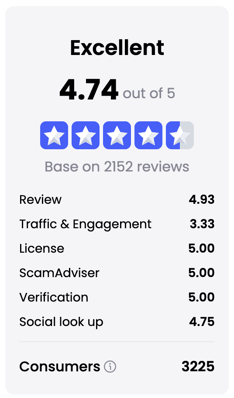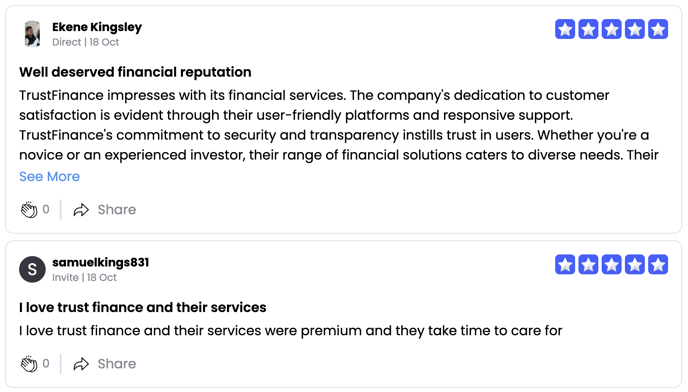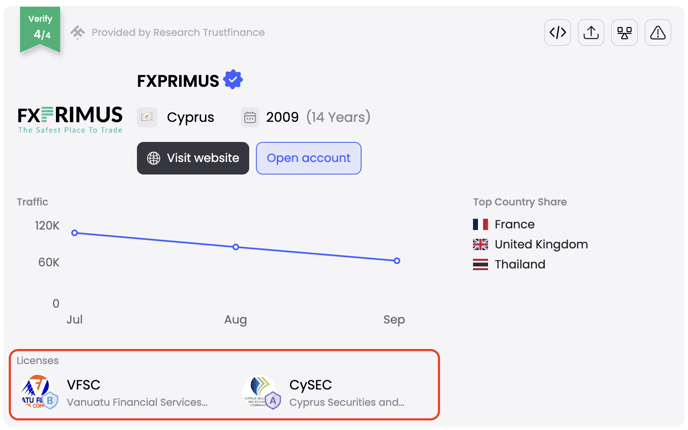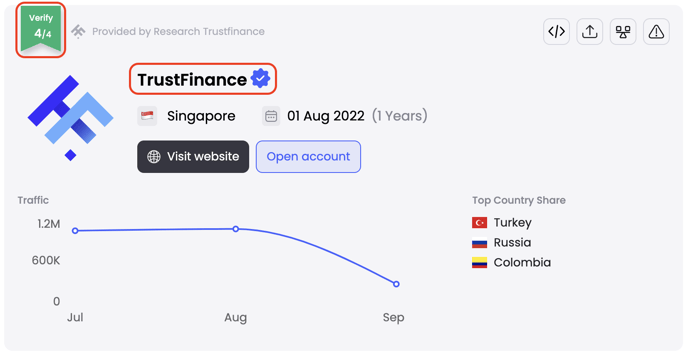Review from Customers: Customer reviews provide insights into a company's trustworthiness, with a focus on the balance of positive and negative feedback.

Trust is the bedrock of any fruitful business relationship. For both consumers seeking reliable service providers and businesses striving to establish themselves as trustworthy entities, trust scores offer invaluable insights. In this blog post, we'll explore the various factors that contribute to the calculation of trust scores and offer an example to illustrate the process.
1. Review from Customers
Customer reviews serve as a wealth of information when assessing a company's trustworthiness. These reviews offer insights into the experiences of past customers, including their satisfaction levels, grievances, and recommendations. A company with a high proportion of positive reviews receives a better trust score, while a plethora of negative reviews can significantly impact the score.

2. License Score
Possessing valid licenses is an indicator of a company's legitimacy and adherence to legal regulations. A company with all the required licenses and permits will receive a higher license score, boosting its trustworthiness. Conversely, unlicensed or unregulated businesses may receive a lower score.

3. Traffic Score
The volume of online traffic a company's website receives is another critical factor in trust score calculations. Higher website traffic often indicates a more established and reputable business. It's important to note that traffic scores are relative to the industry, with companies assessed in comparison to their peers.
Traffic Score Calculation:
The traffic score is a significant component of trust score calculation and is especially important in assessing the online presence and reputation of a company. It involves evaluating the amount of traffic a company's website receives and comparing it to industry standards. Here's a breakdown of how it works:
-
-
Website Traffic Measurement: To determine a company's traffic score, you need to assess the number of visitors the company's website receives. This data can be obtained through various web analytics tools such as Google Analytics. The number of monthly visitors is a critical metric.
-
Comparison to Industry Benchmarks: The next step is to compare the website's traffic to industry benchmarks. This means assessing how the company's website traffic stacks up against other businesses in the same industry or niche. Industry benchmarks are typically based on the average or expected traffic levels for similar businesses.
-
Calculating the Traffic Score: The traffic score is calculated as a percentage based on this comparison. If the company's website receives more traffic than the industry benchmark, it will receive a higher traffic score. Conversely, if the traffic is below the industry average, the score may be lower.
-
Here's a simplified formula for calculating the traffic score:
Traffic Score (%) = (Company's Monthly Traffic / Industry Average Monthly Traffic) x 100%
For example, if a technology company receives 10,000 monthly website visitors, and the industry average for similar technology companies is 5,000 monthly visitors, the traffic score would be:
Traffic Score = (10,000 / 5,000) x 100% = 200%
Traffic Score Calculation and Company Growth with an Example:
Let's dive deeper into the relationship between traffic score calculation and a company's growth, accompanied by an example:
1. Current Traffic Level: The traffic score calculation begins with assessing the company's current website traffic. For instance, Company A in the technology industry receives 20,000 monthly website visitors.
2. Historical Traffic Trends: To gauge growth, we consider historical traffic trends. Over the past year, Company A's website traffic has shown consistent growth:
- 12 months ago: 10,000 monthly visitors
- 6 months ago: 15,000 monthly visitors
- Current: 20,000 monthly visitors
This data indicates that Company A has experienced steady traffic growth, going from 10,000 to 20,000 monthly visitors in one year.
3. Industry Comparisons: To gain insights, we compare Company A's traffic with industry benchmarks. In the technology sector, the industry average for monthly website visitors is 12,000.
4. Future Growth Potential: Company A's growth trajectory surpasses the industry average. This suggests that the company is effectively expanding its online presence and reaching a wider audience. It may also indicate an increasing customer base and potential for future growth.
By comparing Company A's traffic to the industry benchmark, we can calculate its traffic score:
Traffic Score = (Company A's Monthly Traffic / Industry Average Monthly Traffic) x 100%
Traffic Score = (20,000 / 12,000) x 100% = 166.67%
Company A's traffic score is approximately 166.67%. This high score reflects not only its strong current online presence but also its notable growth in website traffic over time, indicating its potential for future expansion
In this case, the company's traffic score is 200%, indicating that it has twice the industry average website traffic. This can be a positive factor in the trust score calculation, as higher traffic is often associated with a more established and reputable online presence.
The traffic score is particularly useful for online businesses, as it reflects their digital footprint and can help potential customers assess the level of engagement and visibility a company has in the online space.
4. ScamAdvisor Score
ScamAdvisor is a valuable partner when assessing a company's trustworthiness. Their scoring system evaluates the level of risk associated with a specific business, considering factors such as website security, domain age, and customer reviews. A favorable ScamAdvisor score contributes to a higher trust score.

5. Verification
Verification is the process through which a company validates the accuracy of the information it provides. Companies that successfully complete the verification process receive a positive boost to their trust score, assuring potential customers of their reliability.

6. Social Lookup
Social media plays a pivotal role in shaping a company's image. Analyzing a company's social media presence provides insights into its engagement with customers and its reputation within the community. A thorough social lookup helps assess the sentiment surrounding a company, further contributing to its trust score.
Social Lookup and Company Reputation: An Example
Let's explore the concept of social lookup in the context of trust score calculation with an example:
Social Media Presence: Company B operates in the fashion industry and maintains active social media profiles on platforms such as Facebook, Instagram, and Twitter. It regularly posts engaging content, interacts with customers, and has a substantial following.
- Facebook: 50,000 followers
- Instagram: 75,000 followers
- Twitter: 30,000 followers
Engagement and Sentiment: Social lookup also involves assessing customer engagement and sentiment. Company B's posts receive high levels of likes, shares, and positive comments. Customers often express their satisfaction with the company's products and services in the comments section.
Competitor Comparison: To gauge the effectiveness of Company B's social media presence, we compare it to industry competitors. In the fashion industry, the average number of followers for similar companies on these platforms is as follows:
- Facebook: 30,000 followers
- Instagram: 50,000 followers
- Twitter: 20,000 followers
Calculating the Social Lookup Score: The social lookup score is determined by comparing Company B's social media presence and engagement to industry benchmarks:
Social Lookup Score (for each platform) = (Company's Followers / Industry Average Followers) x 100%
Social Lookup Score (Facebook) = (50,000 / 30,000) x 100% = 166.67%
Social Lookup Score (Instagram) = (75,000 / 50,000) x 100% = 150%
Social Lookup Score (Twitter) = (30,000 / 20,000) x 100% = 150%
Overall Social Lookup Score (Average of platform scores) = (166.67% + 150% + 150%) / 3 = 155.56%
Company B's overall social lookup score is approximately 155.56%. This high score reflects its robust social media presence, positive customer engagement, and its outperformance in follower count compared to industry competitors.
In this example, the social lookup score not only demonstrates the company's strong online presence but also indicates its effectiveness in building a positive reputation and connecting with customers in the competitive fashion industry. This high score enhances the company's trust score and attractiveness to potential customers and partners.
Calculating the Trust Score
To calculate a trust score, each of the above criteria is assigned a weight based on its importance in your specific context. For example, customer reviews may carry more weight than website traffic, depending on your goals. The scores for each criterion are normalized and then combined to produce an overall trust score.
Example: Calculating Trust Score for XYZ Company
Let's calculate the trust score for XYZ Company, a technology service provider. We'll assign weights to each criterion and then compute the overall trust score.
1. Review from Customers (Weight: 20%)
- XYZ Company has 50 customer reviews.
- 40 reviews are positive, 5 are neutral, and 5 are negative.
Trust Score for Customer Reviews (Bayesian Average)
- Prior Belief (Average Rating): Approximately 4.1 stars
- Weight (Total Number of Reviews): 50 reviews
Bayesian Average Calculation: Bayesian Average = (Weight / (Weight + 5)) * Prior Belief + (5 / (Weight + 5)) * (40 * 5 stars + 5 * 3 stars + 5 * 1 star) / 50 Bayesian Average ≈ 3.727 stars
Trust Score for Customer Reviews: (Bayesian Average / 5) * 100% ≈ (3.727 / 5) * 100% ≈ 74.54%
2. License Score (Weight: 15%)
- XYZ Company holds all the required licenses and permits.
Trust Score for License: 100%
3. Traffic Score (Weight: 10%)
- XYZ Company's website receives 10,000 monthly visitors.
- The average traffic for companies in the technology industry is 5,000 monthly visitors.
Trust Score for Traffic: (10,000 / 5,000) * 100% = 200%
4. ScamAdvisor Score (Weight: 20%)
- XYZ Company's ScamAdvisor score is 90 out of 100.
Trust Score from ScamAdvisor: 90%
5. Verification (Weight: 15%)
- XYZ Company has successfully completed the verification process.
Trust Score for Verification: 100%
6. Social Lookup (Weight: 20%)
- XYZ Company's social media presence is strong, with regular posts, positive comments, and active engagement with its customers.
Trust Score for Social Lookup: 90%
Now, we calculate the overall trust score for XYZ Company:
Overall Trust Score = (20% x Customer Reviews) + (15% x License Score) + (10% x Traffic Score) + (20% x ScamAdvisor Score) + (15% x Verification) + (20% x Social Lookup)
Overall Trust Score = (0.20 * 74.54%) + (0.15 * 100%) + (0.10 * 200%) + (0.20 * 90%) + (0.15 * 100%) + (0.20 * 90%)
Overall Trust Score = 14.908% + 15% + 20% + 18% + 15% + 18% ≈ 100.908%
XYZ Company has received an overall trust score of approximately 100.908%. This high score suggests that the company is highly trustworthy based on the selected criteria. Customers can rely on XYZ Company's services with confidence.
This comprehensive approach to trust score calculation, incorporating the Bayesian Average for customer reviews, offers a more accurate assessment of a company's trustworthiness and assists consumers and businesses in making informed decisions
Note: Weight Depends on Industry
It's essential to recognize that the weights assigned to different trust score criteria can vary based on the specific industry or niche you are assessing. What holds significant importance in one industry may have a different level of relevance in another. Therefore, when calculating trust scores, consider the unique characteristics and priorities of the industry you are evaluating. This customization ensures that trust scores accurately reflect the key factors that matter most in the context of that industry, enabling a more precise assessment of trustworthiness.
.
